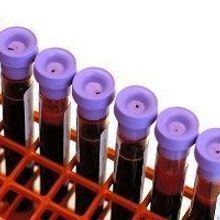Login
Subscribebiomarkers

Toward Blood-based Cancer Detection
Jyoti Madhusoodanan | Jul 7, 2015 | 4 min read
Circulating tumor cells, exosomes, and DNA can improve the diagnosis of many cancers. But are liquid biopsies ready for prime time?

Periodic Fasting Improves Rodent Health
Kerry Grens | Jun 18, 2015 | 2 min read
And a diet that includes a few days of caloric restriction each month reduces biomarkers of aging and disease in people, according to a small trial.

Biomarkers on the Brain: From Sequencing to Functional Imaging
The Scientist | 2 min read
An expert panel will discuss biomarker development for brain disorders and considerations for their clinical use.

Soluble Signal
Jenny Rood | May 1, 2015 | 2 min read
An immune protein previously thought to mark inactive T cells has a free-floating form that correlates with HIV disease progression.

The Challenges of Precision
Adam Marcus | Apr 1, 2015 | 3 min read
Researchers face roadblocks to treating an individual patient’s cancer as a unique disease.

It’s Bittersweet: The Tumorigenic Potential of Glycosylation
The Scientist Creative Services Team in collaboration with Vector Laboratories | 1 min read
Karen Abbott and Susan Bellis discuss how to detect and block tumorigenic glycosylation signatures to diagnose and treat cancer.

My Mighty Mouse
Megan Scudellari | Apr 1, 2015 | 10+ min read
Personal drug regimens based on xenograft mice harboring a single patient’s tumor still need to prove their true utility in medicine.

Quantity or Quality?
Ankita Bansal and Heidi A. Tissenbaum | Mar 1, 2015 | 3 min read
Living longer doesn’t necessarily mean living healthier.

Advancing Cancer Biomarker Detection with Single Cell Proteomics
The Scientist Creative Services Team in Collaboration with IsoPlexis | 2 min read
An improved ELISA-based proteomics chip detects cytokines in single cell applications.

Engineered Biomarkers Could ID Cancer Cells
Jenny Rood | Feb 23, 2015 | 3 min read
Scientists develop synthetic blood-based biomarkers to amplify tumor signals in a mouse model.

A Blood-based Biomarker for Suicide?
Jyoti Madhusoodanan | Jul 31, 2014 | 2 min read
Epigenetic and genetic changes in the SKA2 gene are correlated with suicidal behaviors, researchers show.

Technique Talk: Single Cell Sequencing Sample Preparation for Oncology Research
The Scientist Creative Services Team in collaboration with 10x Genomics | 1 min read
In this workshop, learn tips and tricks for preparing cancer tissue samples for a variety of single cell applications.

Markers Distinguish “Good” from “Bad” Fat
Anna Azvolinsky | Jul 30, 2014 | 3 min read
Researchers have identified three fat cell-specific surface markers that distinguish white from brown and beige adipocytes.

Alzheimer’s in the Blood
Jef Akst | Jul 23, 2014 | 5 min read
Researchers are on a mission to identify blood-borne biomarkers for dementia. Will this year’s high-profile successes pave the way?

Checking Checkpoints for Treating Cancer
The Scientist | 1 min read
Researchers devise strategies to improve checkpoint inhibitor therapy and predict patient response.

Eyes, Nose as Windows to Alzheimer’s
Kerry Grens | Jul 14, 2014 | 2 min read
Failing a sniff test or screening positive on an eye exam may predict people’s chances of developing the neurodegenerative disorder.

Another Alzheimer’s Blood Test?
Jef Akst | Jul 9, 2014 | 2 min read
Researchers identify a set of proteins that can predict the development of Alzheimer’s disease-related dementia with 87 percent accuracy.

Advancements in Exosome Research Tools and Diagnostics
The Scientist | 1 min read
Chris Heger and Johan Skog will discuss exosomes, some of the latest diagnostic applications in the exosome field, and introduce Simple Western technology.

Omnivore Ancestors?
Jyoti Madhusoodanan | Jun 26, 2014 | 2 min read
Fifty-thousand-year-old feces suggest Neanderthals ate both meat and vegetables.

Obesity Complicates Colorectal Cancer
Tracy Vence | Apr 9, 2014 | 2 min read
Study finds that prediagnosis obesity is predictive of poor prognosis, even among patients who have a molecular marker associated with better disease outcome.